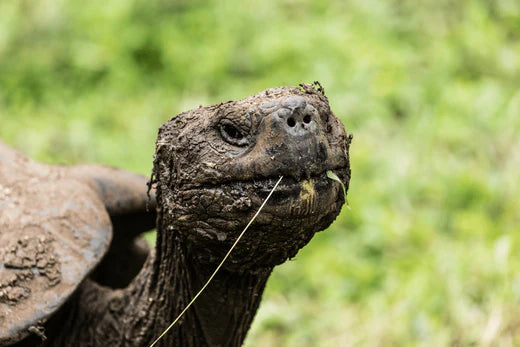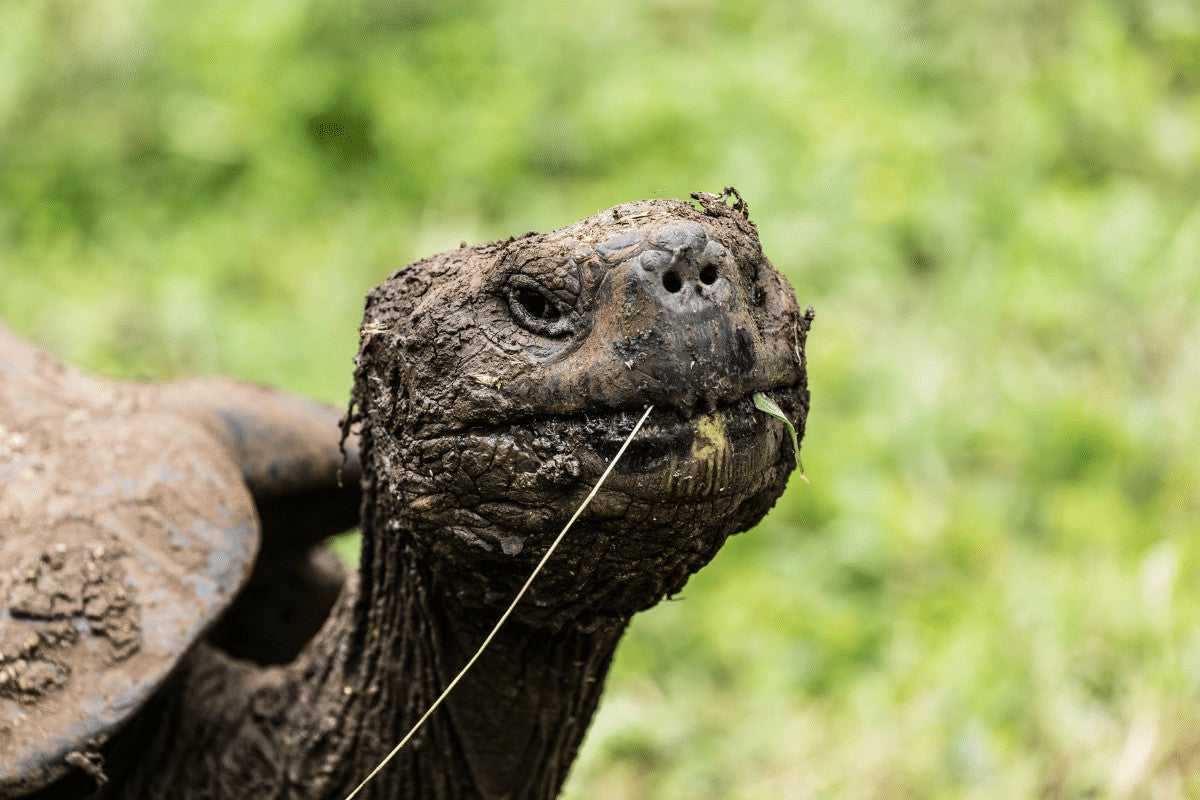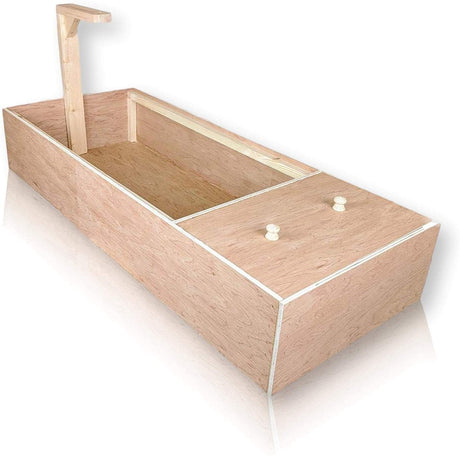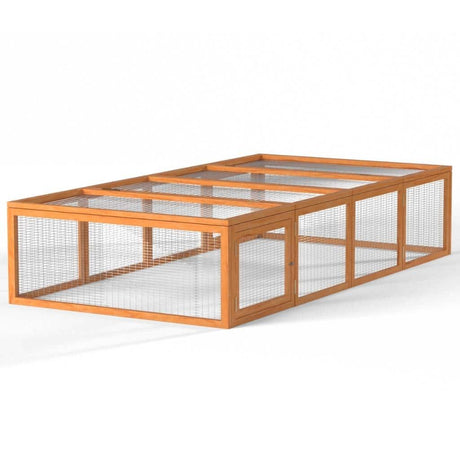Our pets require a delicate balance of nutrients and minerals to remain fit and healthy. However, the problem with feeding tortoises is that different species all have different nutritional requirements to be able to survive. Knowing what tortoises eat in the wild is the first step to providing a balanced diet for them, although it is not always that simple. Do tortoises need to eat every day? What foods are toxic to tortoises? How long can they go without eating?
Let's learn more about the diets of these shelled creatures and how we can provide them with the best care possible.
What Do Tortoises Eat in the Wild?
When formulating diets for animals, it's important to consider what they eat in their natural habitat to see what kind of nutrients they need to be able to thrive. As tortoises can be found in various places across the globe, it's no surprise that their diets vary so greatly; some will need more protein while some tend to drink more water than others. Tortoises are classed as grazers which means that they move from one place to another, eating different things along the way. Most of their natural diet will depend on the area that they live in:
Mediterranean Tortoises
Some species that are defined as Mediterranean tortoises include:
- Hermann's tortoises (Testudo hermanni)
- Spur thighed tortoise (Testudo graeca)
- Russian tortoise (Testudo horsefieldi)
- Marginated tortoise (Testudo marginata)
Mediterranean tortoises can be found in grasslands where they mainly graze on shrubs and succulents.
Tropical (Jungle) Tortoises
Tropical tortoises can be split into two categories, one of which are the jungle variety. They can be found in dense rainforests where food is bountiful therefore they can eat a wide variety of fruits and plants. These tortoises include:
- Red-footed tortoise (Chelonoidis carbonaria)
- Yellow-footed tortoise (Geochelone denticulata)
Tropical (Arid) Tortoises
The second variety of tropical tortoises are those found in habitats that are dry and with fewer foods to choose from. Tortoise species found in arid climates include:
- Sulcata tortoise (Geochelone sulcata)
- Leopard tortoise (Stigmochelys pardalis)
- Indian star tortoise (Geochelone elegans)
These tortoises are more likely to eat grasses, leaves and stems and this is reflected in their captive diet.
Feeding Your Tortoise
While we can take a look at what tortoise diets look like in the wild, we cannot possibly know how that reflects on the kind of foods we have access to at home. That's why researchers have observed the foods that wild tortoises eat and calculated the kind of nutrition that each tortoise should be getting, as well as different food items that have similar nutritional value. This has allowed us to create this guide on exactly what you can and cannot feed your tortoise, from food you can buy at the supermarket to things you can find in your own garden.
What Can a Tortoise Eat?
As their diets can differ so much, let’s break it down a little more to ensure you can give the best care to your pet tortoises. Always research tortoise care before adding one to your family and make sure you can provide them with everything that they need before committing to a new life as a tortoise parent.
Russian Tortoise
As one of the most common pet tortoises across the world, there is a little bit more known about their required diet. In their natural habitat, you would find these tortoises grazing on grasses, succulents, and stems and it is easy to replicate this in your home.
Feed your Russian tortoise dandelions and clover from your garden, as well as chickweed, plantain and bramble leaves. When you go to the supermarket you can pick them up a bag of kale or mix it up with the greens from your turnips. If you have any baby leaf salad, this is a great addition to their diet, too.

A couple of times a week, you may find that they enjoy some peppers, broccoli, or cauliflower and, as a rare treat, maybe even some strawberries or melon.
Hermann's Tortoise
In the wild, Hermann's tortoises have even been known to eat some animal protein from time to time so it's not unheard of to feed them a little dog food, however, we recommend sticking to the veg. Additional protein shouldn't be necessary if the rest of their diet provides everything that they need.
Opt for grass and weeds that are high in fibre such as parsley, dandelion leaves, or collard greens from the supermarket. You can even add in some alfalfa for added fibre, too. Although not as readily available, you can also give your tortoise some cacti which is a great source of hydration.
Similar to the Russian species, you also throw your Hermann's tortoises some peppers, butternut squash, or cabbage leaves. However, be picky on the fruit and only offer it once every couple of weeks as Mediterranean tortoises cannot digest as much as other species.
Sulcata Tortoise
Sulcatas are the third largest species of tortoise in the world. This desert tortoise is a typical grazer and will eat a wide variety of grasses and stems. At home, feed them lots of dark leafy greens, alfalfa, and grasses to ensure they're getting the right nutrition.
They will also love some dandelions or prickly pear cactus when you can find it; they make a great addition to your tortoise's diet. You can also supplement the diet with specially formulated tortoise foods to ensure they get all of their required nutrients and avoid health problems.
On occasion, like the other tortoise diets we have spoken about, you can offer them small amounts of fruits such as apple, melon, or berries. Although your tortoise will love the taste, the high sugar content can cause problems if they are eaten too much.

Red-Footed Tortoise
Although these species are classed as omnivores, we suggest feeding your tortoise greens, flowers, vegetables and fruits as the main bulk of their diet. You can give them dandelions, mustard greens, or even hibiscus flowers, as well as other leafy greens.
These tropical tortoises do require more protein than the other tortoise species therefore it is advised to supplement their diet with a tortoise pellet, or mealworms, for all of their nutritional needs. They can also eat a little more fruit than the other species, therefore you can treat them to some berries or apple more often than you would the others.
Don't forget about their vegetables; red-footed tortoises can also enjoy peppers, butternut squash, and broccoli.
Leopard Tortoise
Needing a high fibre diet, grass hay is a great staple for Stigmochelys pardalis as well as broadleaf weeds; plantain weeds, sowthistles and clover are great additions. Dark leafy greens will provide them with the vitamins that they need, while you may also find they enjoy herbs like coriander, parsley, and mint.
If you want to leave your tortoise in the garden on a warm summers day, they will be more than happy to graze on your grass, however, always make sure to keep an eye on them and remove anything that could be toxic.
A very small portion of their diet can be made up of fruit so you can sometimes offer berries as an extra treat!
General Rules
Although this is not an extensive list of all of the tortoise species that you could have as a pet, it is a great start. Whether your tortoise is on our list above or not, take note of these guidelines when feeding your tortoise:
- Buy vegetables and plants that are grown without chemicals
- If you are unsure of the identification of a plant in your garden, ask a specialist or simply don't risk it
- Commercially grown fruits often contain more sugar than their natural counterparts so keep fruit to a minimum
- Mix it up a bit! Some tortoises can eat up to 200 different species of plants in the wild so it's nice to give them a bit of variety when possible
- Feeding your tortoise isn't just about keeping them at a healthy weight, you will also need to consider their shell growth, beak management, and hydration, too
- Remove any uneaten food at the end of the day and give them fresh food the following morning
Plants
By no means an extensive list, here are some plants you can find in your garden or buy at the supermarket to feed your tortoise:
- Dandelion leaves (try to choose younger leaves when possible as older leaves contain a high concentration of oxalic acid which can be dangerous at high levels)
- Clover
- Mustard leaves
- Turnip leaves
- Collard greens
- Chicory
- Sowthistle
- Shepherd's purse
- Plantain plants
- Evening primrose
- Creeping thistle
- Hedge mustard
- Bristly oxtongue
- Red clover
- Field bindweed
- Scotch thistle
- Sea holly
- Cactus pads
- Hibiscus flowers
Vegetables
Natural homegrown foods are always preferred but there are many types of vegetables you can buy that can be safely fed to your tortoise in moderation:
- Carrots
- Cucumber
- Celery
- Red cabbage
- Bell peppers
- Kale
- Pumpkin
- Butternut squash
- Iceberg lettuce (while popular and safe to feed, lettuce doesn't have much nutritional value so use sparingly)

Fruits
As we have mentioned previously, the high sugar content in fruit can cause health issues in your tortoise. While some species of tortoise are allowed more than others, it's best to err on the side of caution and only feed your tortoise fruits on the rare occasion. Here are some fruits that are safe for your shelled friend:
- Strawberries
- Blueberries
- Watermelon
- Cantaloupe
- Peaches
- Grapes
- Apple
- Pear
Toxic Foods
Never feed your tortoise something if you are unable identify it; if you are unsure it is better to be safe than sorry! Here are some foods that should be avoided, no matter the species:
- Citrus fruits
- Bleeding heart
- Chilli peppers
- Daffodil
- Iris
- Buttercup
- Foxglove
- Rhododendron
- Avocado
- Ivy
- Tiger lily
- Hydrangea
- Rosemary
- Potato
- Bread
- Yoghurt
- Peas and beans (are high in phytic acid which is dangerous for tortoises)
This is not a comprehensive list so always ask for advice from a vet or a specialist before feeding your tortoise something new.
Vitamins and Minerals
As with all animals, tortoises need specific vitamins and minerals to be able to remain healthy. Ask for advice from specialists when adding new supplements to your tortoise's diet. Deficiencies can cause many health issues and affect the development of your tortoise's shell and skeletal structure.
Calcium
Calcium is vital in a tortoise diet and supports healthy growth and maintenance of their shells and bones. Without calcium, their shell will develop slower than their body which can cause lots of unhealthy complications for your tortoise which are easily avoidable.
While some plants, such as dandelion leaves and flowers, are great sources of calcium, you may need to supplement their diet in different ways to ensure they are receiving a sufficient amount.
- Cuttlefish can be bought at most pet shops and is a natural way of adding extra calcium to the menu. You can leave it in your tortoise's enclosure for them to use at their leisure. Cuttlefish also helps to shape their beak and prevent it from overgrowing. Without giving tougher materials for them to wear their beaks down, you will need to trim it yourself which can often be a stressful experience for your tortoise.
- A tortoise block is another alternative that can be easily found however take note of any additional ingredients that may be added to and how this could impact your tortoise's current diet. Most products will display the full ingredients so you can make a decision that is best for your pet.
- Calcium powder is another option and can be dusted over your normal tortoise food. You can sometimes find multivitamin products that will include calcium but be sure that this doesn't interfere with the other food on your tortoise's menu.
Vitamin D
In order to absorb the calcium for their growth and development, tortoises need vitamin D3 in their diet. In their natural habitat, they would get this vitamin from the sun however as most tortoise pets are kept indoors, this needs to be provided in other ways.
Choosing a high-quality UV lamp for your tortoise house so that they can bask under the light will stimulate the production of vitamin D3 and ensure your tortoise is able to utilise the calcium you are supplying.
D3 can also be found in various products that can be sprinkled over the food like the calcium

Commercial Diets
Asides from feeding a tortoise a variety of plants, fruit and vegetables, there are also some high-quality commercial tortoise foods that you can use on a daily basis. These often come in pellet form and are specially formulated to ensure your tortoise receives all of the nutrients it needs to be healthy.
You can also find other treats in the form of snack bars and dried flowers at local pet stores if you are unable to source fresh flowers near your home.

What Do Tortoises Drink?
Tortoises need water, as do most animals on this planet, so it is vital to provide them with fresh drinking water on a daily basis. This is ideally done in a shallow water bowl that your tortoise can climb in and out of.
It is also recommended to give your tortoise a bath a few times a week to give them the opportunity to drink water; tortoises drink by submerging their mouths underwater, but also by absorbing water through the vent in their tails. For this reason, they may also defecate in their baths or water bowls so change the water as soon as this happens.

Tortoises can also get water from their foods which is another reason why a variety of plants, fruit, and vegetables ensure your tortoise gets everything it needs!
How Often Should You Feed a Tortoise?
There is a lot of debate around how often you should feed a tortoise and there are lots of factors to take into consideration. If your tortoise is allowed to graze outside in your garden then you may not need to provide designated meals as frequently.
As a juvenile, your tortoise should be receiving food on a daily basis however as they get older, it is safe to provide meals 5 or 6 days a week.
You can feed your tortoise one big meal or you can split it into two smaller meals, but remove any food that starts to look old before adding anything new, and always remove any food at the end of the day.
How Much Should You Feed a Tortoise?
A general rule of thumb, whether you own Indian star tortoises or a sulcata tortoise, is that you should provide leaves and plants in the same volume as your tortoise’s shell. However, this is obviously not an accurate way of measuring your tortoise's food, especially if you are feeding a variety of plants and vegetables as is recommended.
As tortoises are grazers, many professionals suggest giving them ample food to eat throughout the day and simply removing anything that is left over. If you notice significant weight gain or loss then you can adjust accordingly, and consult your vet to make sure you are giving them sufficient amounts to meet their nutritional requirements.
Most pellet diets will state the recommended feeding guidelines on the packaging which will make it easier to give the correct amount, no matter the species you are caring for.
Why is My Tortoise Not Eating?
If your tortoise suddenly stops eating then it could be for a number of different reasons and you should seek medical advice to ensure that they receive the best care. Factors such as environmental temperature, terrain type, or level of sunlight can have a big impact on tortoise behaviour, so if it's too cold they may go off their food. Alternatively, they could have a respiratory infection or even intestinal parasites, which is why it is always best to check with a specialist vet if there is any change in their feeding habits.
Final Thoughts
Formulating a healthy and balanced tortoise diet can be difficult to do. From sources of protein to hydration levels and the importance of calcium and vitamin D, there is so much to take in to consideration to ensure your tortoise food is filled with everything that they need to stay healthy.
No matter the species that you are caring for, whether it be Mediterranean or tropical, make sure that you do your research and follow the guidelines to keep a healthy happy tortoise. Remember, never feed your shelled friend something if you cannot positively identify it, and give them as much variety as you can.
Your pet tortoise will surely thank you for taking the time to create a nutritionally balanced diet that will provide them with everything that they need.
What species of tortoise do you have and what do you feed them? We'd love to hear about your experiences and all of your tortoise's favourite foods!






1 comment
You need to Google ‘Tortoise Table Plant Database’. A number of the vegetables you are suggesting feeding are totally unsuitable for Mediterranean Tortoises. You also state they can be fed fruits occasionally which is absolutely wrong.